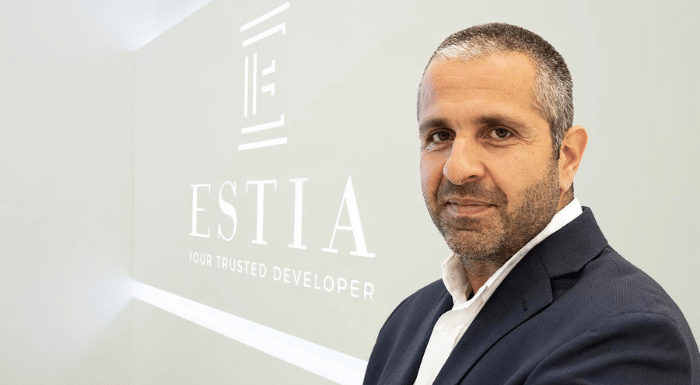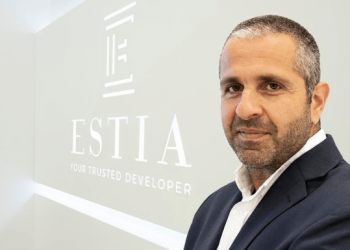Estia Developments is a real estate company that mainly focuses on the Greek residential segment, developing high-end properties to a variety of urban residences. Estia’s offices are found in Lebanon, China, and Portugal.
CEEREM: As one of the Estia’s founding partners, how would you describe your initial drive to base the company’s main activity in Greece?
I come from a long line of entrepreneurs from Lebanon, including in-land and real estate development operated on large urban scales. Considering Lebanon’s looming financial crisis after 2010, I started looking at opportunities abroad, with my eye out for an organic, self-sufficient market, one that would truly make sense as a viable long-term investment. Greece, first, stood out given the natural gifts it has been endowed with – the most beautiful sea in the world, thousands of islands, a capital city with eight months of sunshine, as well as delicious food, friendly and genuine people.
I came to Greece in 2015, when the country was at the peak of the financial crisis, whereas the opportunities were very appealing – we could buy properties at EUR 300-400 per square meter in certain areas, with rental yields averaging 10-15%. We invested in hotels and Airbnb suited properties, and then we started developing our own projects in the Center and South of Athens. It was a difficult time and an uphill battle – we had to convince investors that Greece was still very much worth placing their trust and money into. I was convinced that a country benefitting from 40 million visitors every year would always come out as a winner.
CEEREM: Given how built-up Athens is currently and how diverse the real estate offering is all over the country, is it still a good time to invest? Wherein lies the opportunity.
The opportunity lies in creating value. Every area has its specificity in Greece, and some people buy according to numbers and graphs because they make sense, while others will happily spend EUR 10,000 per square meter in the South for emotional reasons. Mykonos is not Cannes or Monte Carlo – it is a hundred times better. Investors and developers will easily find a client base in Greece.
In my opinion most money can be made in under-developed areas where you can still buy for EUR 500-600 per square meter, also known to be filled with expats and problems, that are now seen as “grimy” but are in fact self-cleaning. When you come to Greece you need to be adventurous. The same things happened in the United States with the gentrification of previously ran-down areas.
CEEREM: What are some flagship projects you are working on now, and the trends driving them?
We currently have around 2,000 rental apartments under our management. Two main trends driving the prices here are tourism and expats. We also have made several acquisitions in the past year in Glyfada, Voula and Palaio Faliro, while adopting an Athens-centric strategy. We invested in dozens of properties from rougher Athenian districts to high-end ones, and as football, every area has its own targeted fans. The future purchasing power depends on the bank’s ability to give out loans, and once they are back at full grant, you will see the Greek market booming like no other in the world. Therefore, we are diversifying our portfolio here.
CEEREM: The pandemic may have allowed the residential segment to flourish; however, the hotel and leisure industries were hit quite hard overall – how did the impact reach you?
As a matter of fact, it has been a very good year for us. We knew how to advertise Greece’s success in terms of handling the health crisis. Financial support from both the EU and the government was a massive help and incentivized most businesses to continue operating. At that time, our hotels were still managing to operate at 50% capacity at their worst, and the residential segment remained well afloat, because people kept coming to Greece.
CEEREM: Which part of the world are you noticing highest demand from and how is that reflected in your international presence?
We have many clients from Arab countries, China, and various European countries, but we are open to investors from all around the world. We have a one-stop-shop approach and help them with everything they might need along the way: from in-house feasibility studies and opening a bank account to engineering and finding local suppliers. As for our international presence, we have offices in Lebanon, China, and Portugal. We are also developing properties in Lebanon and Portugal, two other gorgeous countries with good amount of sunshine, good food and wonderfully hospitable people.
CEEREM: What are your main plans for Estia in the coming two to three years?
The number one priority is securing enough land bank because we know what is coming to Greece and want to be prepared for the upcoming waves of investment. Greece’s number one challenge is its limited landbank and lack of new developments. Secondly, we are strengthening our team. The government is doing a great job in digitalizing its systems, but it still takes a while to navigate them and to avoid any delays in the development process. Several people are needed to take care of permitting, utilities, and the list goes on. Finally, we are constantly keeping an eye out for new markets to expand into – the winning combination is high quality of life and high yields.
















